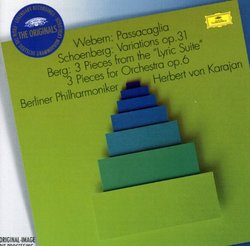| All Artists: Anton Webern, Alban Berg, Arnold Schoenberg, Herbert von Karajan, Berlin Philharmonic Orchestra Title: Schoenberg, Berg, Webern: Orchestral Works / Karajan Members Wishing: 1 Total Copies: 0 Label: Dg Imports Release Date: 10/4/1999 Album Type: Import Genre: Classical Styles: Opera & Classical Vocal, Historical Periods, Modern, 20th, & 21st Century, Symphonies Number of Discs: 1 SwapaCD Credits: 1 UPC: 028945776026 |
Search - Anton Webern, Alban Berg, Arnold Schoenberg :: Schoenberg, Berg, Webern: Orchestral Works / Karajan
 | Anton Webern, Alban Berg, Arnold Schoenberg Schoenberg, Berg, Webern: Orchestral Works / Karajan Genre: Classical
|
Larger Image |
CD Details |
CD ReviewsCareful -- Not the same as the LP of same name. R. Caltabiano | 01/27/2002 (3 out of 5 stars) "No arguments with other reviews, but although this has the same name and same cover picture as the old DG vinyl 2711-014, it has less than half the pieces of that LP. Not included: Verklarte Nacth and Webern's Op. 5, Op. 6, and Op. 21." A milestone recording returns Bruce Hodges | New York, NY | 11/01/2002 (5 out of 5 stars) "Herbert von Karajan and the Berlin Philharmonic produce ravishing sounds in this collection, which was their first foray into the music of these composers. There are many ways to play these pieces, but surely they have never sounded as sheerly beautiful and as refined as in this collection. Originally issued in the 1970's, DG has brought this back as part of its excellent "DG Originals" series. (There is also an all-Schoenberg disc with "Verklärte Nacht" and "Pelleas und Melisande," highly recommended.)Throughout this program, von Karajan and the orchestra confront this hair-raisingly difficult music with total coolness. (Some say, too cool.) Technical challenges that might overwhelm lesser orchestras are brushed aside like gnats. The Webern "Passacaglia" has probably never sounded so sensual, with the Berlin string section shimmering in dreamlike waves. The Berg "Lyric Suite" and "Three Pieces for Orchestra" are classics, and stunningly done here. But for many the summit will be the Schoenberg, with its rigorous structure complemented by the brilliance of the playing. If you are not inclined toward this music, this collection might sway you otherwise, and if you do like these composers, you owe it to yourself to hear this. Excellent analog recording, newly remastered." A Fantastic Disc! Sébastien Melmoth | Hôtel d'Alsace, PARIS | 01/30/2005 (5 out of 5 stars) ".
This (now going out of print) was culled from: Second Viennese School (Berg, Webern, Schoenberg)/Karajan & Berlin Philharmonic Orchestra (3 CDs) and I would highly recommed that set if you can find a copy (3CDs in double jewel box). The other critics have just about said it all: I would only add that these realizations by von Karajan and the BPO are the CLEAREST available. Schoenberg's Variations for Orchestra are especially fine: it's not as widely recognized as it should that Schoneberg was one of the greatest orchestrators of all composers: he surpasses Berlioz, Korsakov, and Mahler. Karajan effects crystal-clarity in a razor-sharp realization. Berg's Three Orchestral Pieces are extremely difficult for an orchestra to properly realize, but here Karajan has the vision and technique to bring it to life. Abbado's realization with the VPO is more murky--I believe--however, it's still good, so see for yourselves: Berg: Pieces Orchestra (3)/Early Songs (7) (bonus Schiele cover art!) or Alban Berg Collection / Various (Coll). ." |

 Track Listings (19) - Disc #1
Track Listings (19) - Disc #1